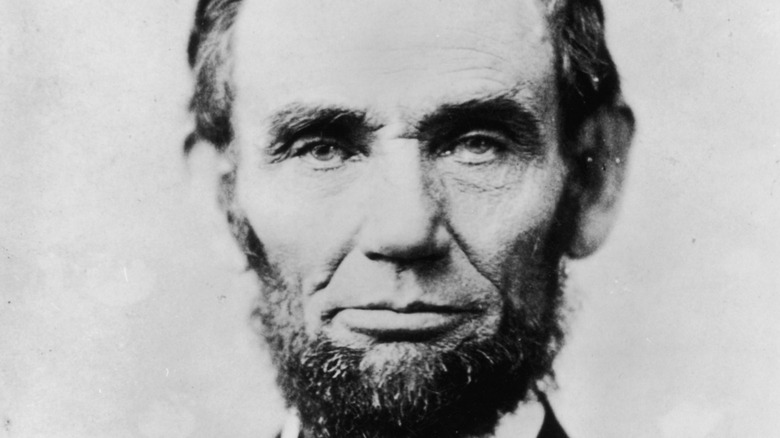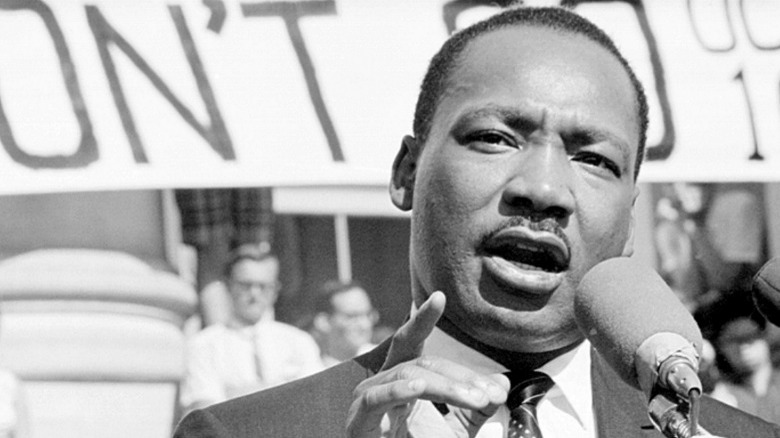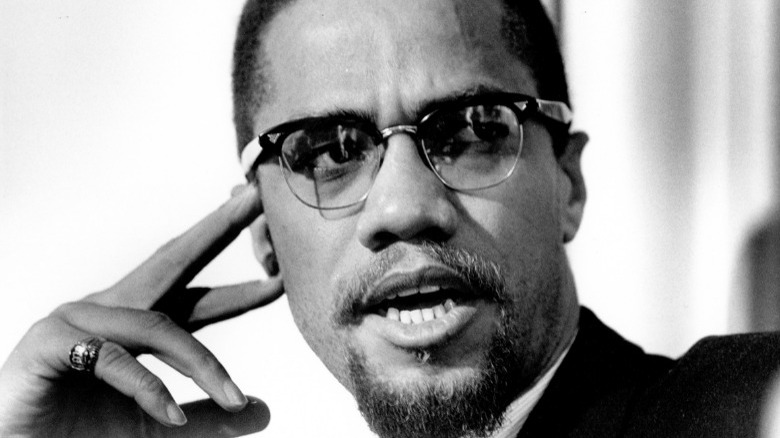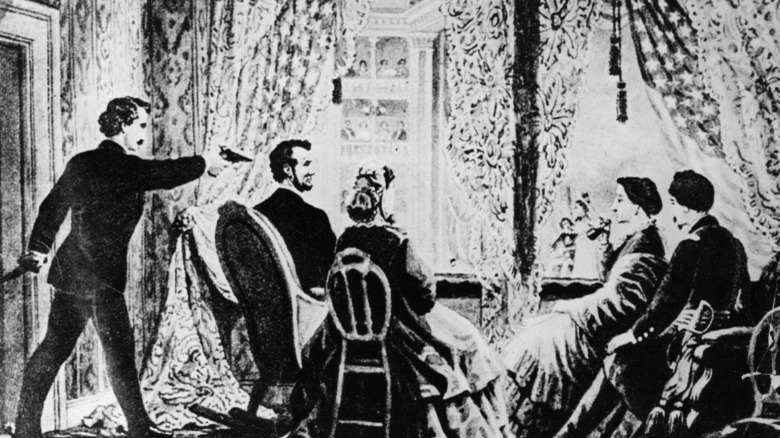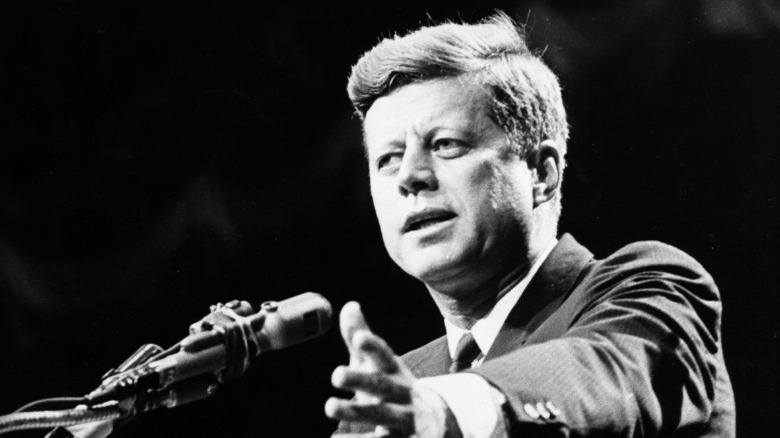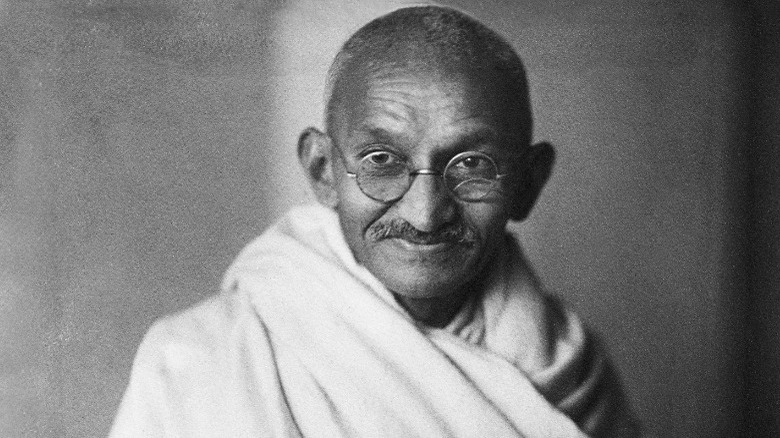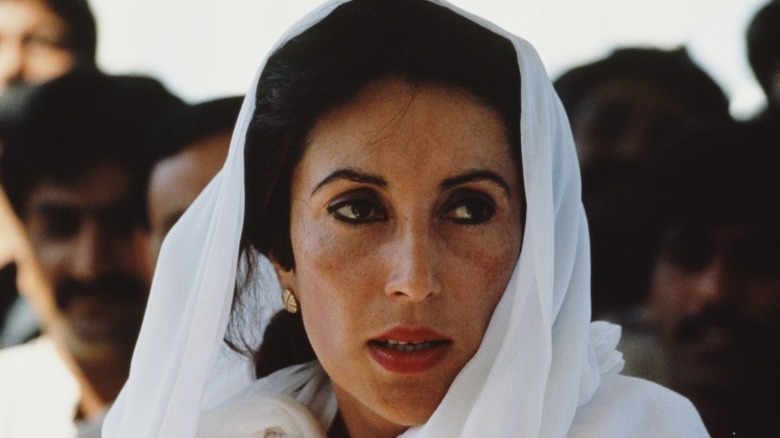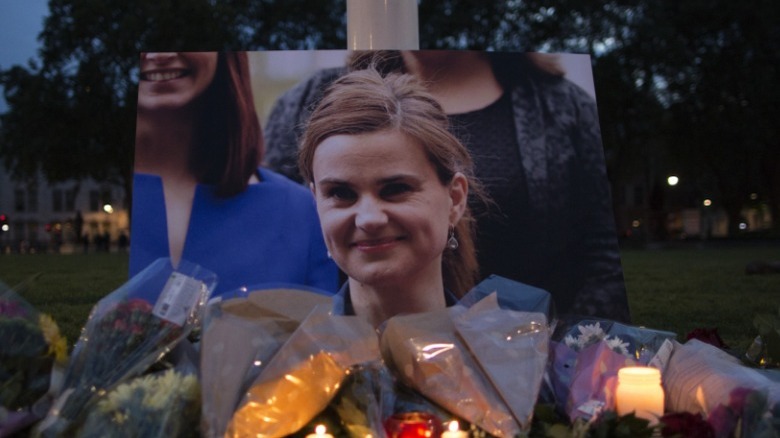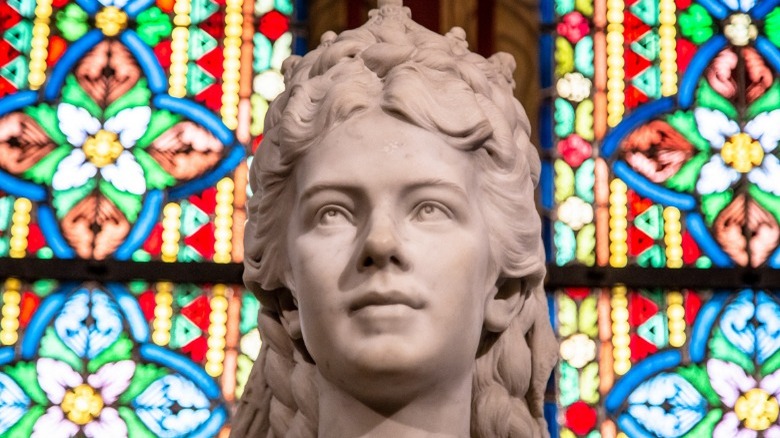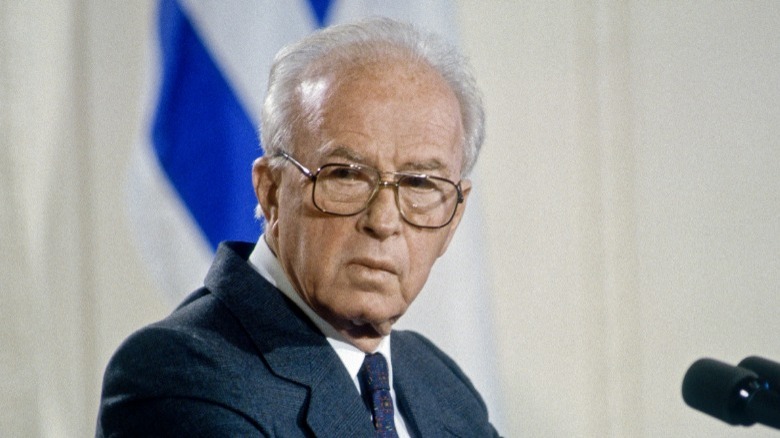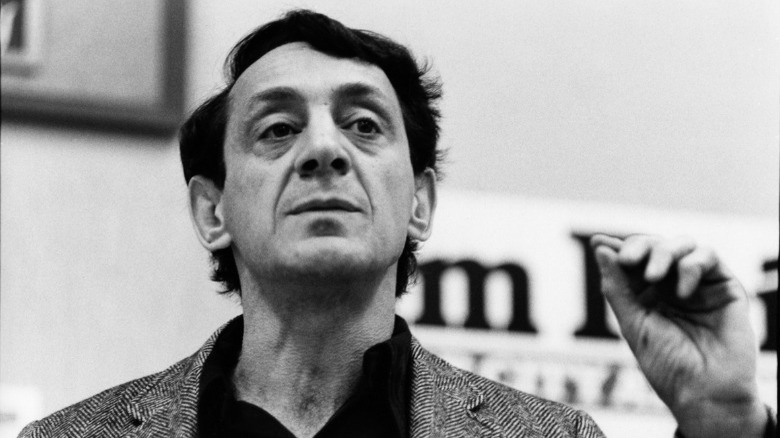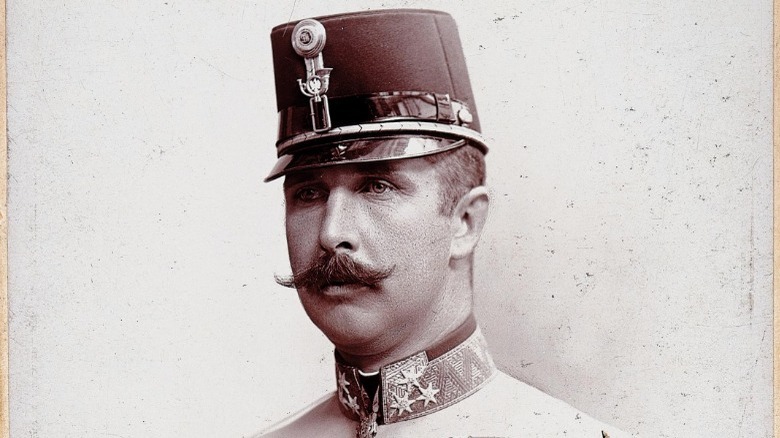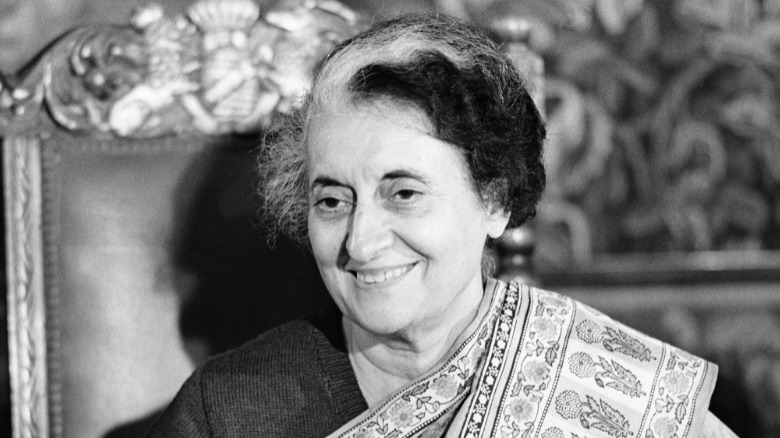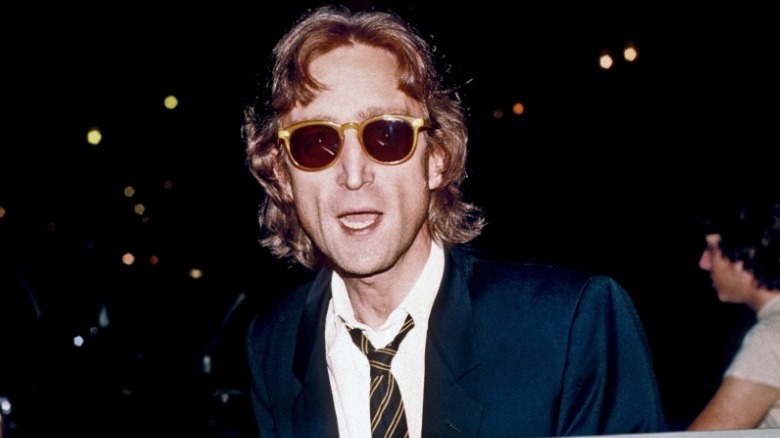This Is How Old These People Were When They Were Assassinated
Merriam-Webster defines assassination as "murder by sudden or secret attack often for political reasons." Such violence has been common throughout history, with leaders in politics, business, and the arts killed for reasons both personal and political. Whether it's ancient Rome or contemporary America, the consequences of these violent acts are often felt at national and international levels. In the case of Archduke Franz Ferdinand, assassination triggered an entire world war (via Biography).
Some would argue that assassinations have never been more common than in the 21st century. New York Times journalist Robert Wright wrote, "I wouldn't have believed you if you'd told me 20 years ago that America would someday be routinely firing missiles into countries it's not at war with." However, one constant throughout history is that assassins have no respect for the age of their victim. Here's how old these politicians, activists, and royal figures were when they were assassinated.
Martin Luther King Jr.
Civil rights leader Martin Luther King Jr. was just 39 when he was assassinated in Memphis, Tennessee on April 4, 1968 (via Britannica). According to Stanford University, the iconic civil rights leader was staying at the Lorraine Motel to organize a march for city sanitation workers who were striking about their employer's neglect and abuse. King told the group, "We've got to give ourselves to this struggle until the end. Nothing would be more tragic than to stop at this point, in Memphis. We've got to see it through" (via CNN).
On the evening of April 4, King emerged onto the motel's balcony to speak with members of the Southern Christian Leadership Conference who had congregated below. As he stood in front of room 306, a bullet struck him in the face, causing major injuries to his cheek, jaw, spinal column, and jugular vein. He arrived at hospital at 6:15pm and was declared dead at 7:05pm (via U.S. House of Representatives report).
The killer was identified as James Earl Ray, a fugitive who had escaped from Missouri State Penitentiary in 1967, according to Biography. It is unclear how Ray ended up in Memphis on April 4, 1968. But on that tragic evening, Ray checked into Bessie Brewer's roominghouse, which was across the street from the Lorraine Motel. After he shot King from the bathroom window, Ray fled the scene and embarked on a lengthy trip to London, England, where he was apprehended on July 19, 1968. After pleading guilty, he was sentenced to 99 years in prison.
Malcolm X
Malcolm X was only 39 when he was shot dead by three Nation of Islam followers (via Britannica). Like Martin Luther King, Malcom X was a leading civil rights figure and is quoted by PBS as saying, "Dr. King wants the same thing I want — freedom!" However, Malcolm X did not share MLK's ideas on faith, integration, and the ethos of non-violent protest. In fact, earlier in his career, Malcolm X called King a "fool" and an "Uncle Tom."
Malcolm X's stance changed in April 1962 when Nation of Islam member Ronald Stokes was shot by police, which caused Malcom to criticize the Nation's leader, Elijah Muhammad, for what he thought was the Nation's weak and permissive response (via Literary Hub). According to U.S. History, Malcom X split with the Nation of Islam in 1963, which rankled other African American Muslim groups. He also founded the Organization of Afro-American Unity, which signalled a new moderation in his attitude that was more closely aligned with MLK's vision (via History). Despite his shifting perspective, Malcolm X remained a committed Muslim, making a pilgrimage to Mecca in 1964.
On February 21, 1965, Malcolm X took to the stage at the Audubon Ballroom in New York City. As he greeted the audience, gunmen stormed the area and shot him over a dozen times. Biography reported that three members of the Nation of Islam — Talmadge Hayer, Thomas 15X Johnson, and Norman 3X Butler — were convicted of the murder in 1966. In 2021, the New York Times reported that Butler and Thomas were exonerated after a re-investigation of their cases found that key evidence had been withheld during their original trial.
Abraham Lincoln
President Abraham Lincoln was 56 when he was assassinated by John Wilkes Booth on the evening of April 14, 1865. The president was watching a performance of "Our American Cousin" at Ford's Theatre in Washington, D.C., when Booth, a famous actor and Confederate sympathizer, snuck into the state box and fired his .44 derringer pistol into the back of Lincoln's head (via NPS). After a nine-hour coma, President Lincoln died early the following morning (via Biography).
Lincoln had led the United States through the Civil War, which was finally in its closing month after killing some 700,000 people, according to the New York Times. Remembered for his intelligence, humility, communication, and sense of purpose, Lincoln's war leadership is perhaps best known for the Gettysburg Address, which was described by The Atlantic as, "the words that remade America."
According to Teaching History, Booth believed that President Lincoln wished to overturn the Constitution and abolish the South, so when Robert E. Lee surrendered his Confederate forces on April 9, 1965, Booth resolved to do something about it. This was despite a lucrative stage career that earned him $20,000 a year, which was vastly larger than the average annual salary of just $300. After shooting Lincoln, Booth jumped from the state box and onto the stage, breaking his leg in the process (via Ford Theatre). Through luck and sheer adrenaline, Booth managed to escape and flee authorities until April 26, when he was found in a Maryland barn by Union troops, one of whom fatally shot him.
John F. Kennedy
The youngest man to be elected president, John F. Kennedy was just 46 when he was assassinated on November 22, 1963 (via JFK Library and History). The 35th president was in Dallas, which he referred to as "nut country" to his wife Jackie, according to The Guardian. He said this because of how hostile the city was to him. According to "Dallas 1963" author Steven Davis, "Dallas was really the antithesis of what Kennedy represented" (via The Guardian).
However, on the morning and afternoon of November 22, Kennedy was received with great fanfare by scores of Dallasites, who lined the streets throughout the city (via "Four Days"). As Kennedy's motorcade left Main Street, his passenger Nellie Connally, the wife of Texas governor John Connally, turned to the president and said, "You can't say that Dallas isn't friendly to you today," to which Kennedy replied, "No, you certainly can't" (via "Four Days" and Reader's Digest).
Fractions of a second later, a bullet struck paving to the right of the motorcade. A second bullet hit Kennedy's neck, exited his throat, and struck Governor Connally in the front seat, seriously injuring him. As Kennedy writhed in pain, a third bullet struck his head, causing fatal injuries, according to the Warren Commission. The president had been mortally wounded by Lee Harvey Oswald, a 24-year-old communist sympathizer who was positioned in the Texas School Book Depository. He would be assassinated himself just two days later by Jack Ruby, a nightclub owner (via Britannica).
Mahatma Gandhi
Mohandas Gandhi was 78 when he was assassinated by a Hindu extremist on January 31, 1948 (via The Guardian). Addressed as the Mahatma, which is a Sanskrit word meaning "great soul," Gandhi's death was met with global mourning from people of all creeds, classes, and nationalities, according to Britannica.
Among the most famous people of the 20th century, Gandhi was a leading figure in securing the Indian Independence Bill, which established the independent nations of India and Pakistan on August 15, 1947 (via History). Gandhi described Indian independence as, "the noblest act of the British nation," which underscored Gandhi's peaceful and magnanimous political activism.
The man who shot Gandhi was Nathuram Godse, a 37-year-old Hindu nationalist from Baramati, Pune (via News18). Godse disliked Gandhi's support for Muslims and blamed him for the existence of Pakistan. Tragically, the two met in the gardens of Birla House, New Delhi. Gandhi is reported to have smiled at Godse, who stood just five feet away when he produced a handgun, which he fired three times, hitting Gandhi in the chest, stomach, and groin. After withstanding a vicious mob beating, Godse was detained by police and hanged on November 15, 1949.
Benazir Bhutto
Former Pakistani prime minister Benazir Bhutto was the daughter of Zulfikar Ali Bhutto, who served as prime minister from 1973 to 1977 and was executed in 1979 for ordering the assassination of political enemies (via National Portrait Gallery). Bhutto assumed the leadership of her father's party, the Pakistan People's Party, and led the country between 1988 and 1990, as well as from 1993 to 1996. According to History, Benazir Bhutto was the first democratically elected female leader of a Muslim country.
Bhutto's life was marked by much resistance and oppression. In the 1970s, she was put under house arrest by Mohammad Zia ul-Haq's military dictatorship, and she was forced into exile on more than one occasion. She also lost two brothers — one to a suspected poisoning and the other to a gun battle with Karachi police.
Her position in Pakistani society became perilously unsafe in the 2000s. During her homecoming parade on October 18, 2007, Bhutto narrowly survived a suicide bombing when she ducked behind her armored vehicle. Tragically, 136 others were killed. Just over two months later, after addressing a crowd on December 27, Bhutto and 27 others were killed in another gun and bomb suicide attack. She was 54 years old, and in her murder's aftermath, President Pervez Musharraf announced three days of mourning.
Jo Cox
British politician Jo Cox was just 41 years old when she attended a meeting in Birstall, West Yorkshire, on June 16, 2016 (via BBC). As she exited her vehicle, Cox was attacked by Thomas Mair, a 53-year-old unemployed gardener. Wielding a dagger and a sawn-off .22 rifle, Mair shot Cox twice in the head and once in the chest before stabbing the mother of two 15 times (via The Guardian).
As he committed this wicked crime, Mair is reported to have shouted "Britain first," "this is for Britain", and "keep Britain independent." When police raided Mair's home, they found a trove of books on Nazism, white supremacy, and an assortment of far-right memorabilia. During Mair's court case, the judge said, "Our parents' generation made huge sacrifices to defeat those ideas and values in the Second World War. What you did ... betrays those sacrifices."
According to The Independent, Cox was the first member of Parliament (MP) to be assassinated since Ian Gow, who was murdered by the Irish Republican Army in 1990. Tragically, another MP, Sir David Amess, would be murdered just over five years later on October 15, 2021. He was the ninth British parliamentarian to be killed in the nation's history.
Empress Elisabeth of Austria
Empress Elisabeth of Austria was 60 when she was assassinated by an Italian anarchist on September 10, 1898 (via Britannica). Known as Sisi, the Empress had a very privileged life, yet she experienced long-standing mental health issues such as depression and an eating disorder, according to History. She spent much of time exercising or travelling, visiting England, Ireland, Switzerland, Hungary, and Greece, where she commissioned The Achilleion, a sprawling palace on the island of Corfu (via Palaces of Europe).
But in 1889, Elisabeth's mental health reached a new low when her son, Crown Prince Rudolf, killed his mistress and himself in a murder-suicide pact. She spent the next nine years of her life travelling, vowing to "travel the whole world over ... until I drown and am forgotten."
On September 10, 1898, the empress visited Geneva, Switzerland, where she would become the latest victim of anarchist violence, which had killed five members of the European ruling class, including two Spanish premiers and an Italian king. As Elisabeth walked along a dock, Luigi Lucheni stabbed her once with a metal file, inflicting a mortal injury. According to Habsburger, Lucheni committed suicide after 12 years in prison.
Yitzhak Rabin
Israeli Prime Minister Yitzhak Rabin was 73 when he was killed by a Jewish extremist on November 4, 1995 (via Britannica). Rabin won the Nobel Peace Prize in 1994 for his negotation of the Oslo Accords, which agreed that Israel would withdraw from occupied territories and grant self-determination to the Palestinian population (via Nobel Prize).
Brookings Institute wrote that, at the time, the Oslo Accords seemed like a "historic turning point." However, Israeli extremists — including Yigal Amir, who shot Rabin twice — were enraged by the deal. According to writer Yossi Klein, this simple act of violence successfully reversed the painstaking efforts to achieve peace: "Twenty-four years on, the bottom line is that Yigal Amir won. He achieved all his goals and more. He ... stopped the peace process, killed the man who led it and brought his rival into power."
Despite Rabin's efforts, today, the Oslo Accords are viewed as a distant failure. Speaking to the New York Times, Alaa Tartir, an advisor for the Palestinian Policy Network, said, "If we're talking about the P.A. as a step toward statehood, then it's failed miserably. As a step toward self-determination, or toward realization of the Palestinians' political and human rights, then it's failed again. But if we're talking about providing jobs as a bureaucracy, then it's worked."
Harvey Milk
Harvey Milk was the first openly gay elected official in California history. He was assassinated on November 27, 1978, aged just 48 (via Britannica).
Before Milk moved to San Francisco in the early 1970s, he served in the U.S. Navy and worked as financial analyst in New York City. In 1964, the politically conservative Milk campaigned for Barry Goldwater and lived a closeted life that appeared conventional and straight-edged (via History). In 1972, Milk opened a camera store in San Francisco's Castro Street, where he became well known in the gay community. Frustrated by local tax laws, Milk ran for the San Francisco Board of Supervisors, coming in 10th place out of 32 with some 17,000 votes. This encouraged Milk to pursue a political career, which culminated in him becoming the country's first openly gay public official in 1977, according to The Guardian.
Milk received many death threats during his political career, to which he replied, "If a bullet should enter my brain, let that bullet destroy every closet door." Tragically, Milk was shot dead not by an anonymous assassin, but by Dan White, his City Hall colleague. White, who was supposedly suffering from major depression, killed both Milk and San Francisco mayor George Moscone because they refused to reinstate him as a supervisor. On May 21, 1979, White would be sentenced to just eight years for manslaughter, a lenient conviction that was achieved by what has been termed the "Twinkie Defense."
Archduke Franz Ferdinand
Perhaps the most consequential assassination in history, Archduke Franz Ferdinand was 50 years old when he was shot dead by Serb nationalist Gavrilo Princip on June 28, 1914 (via Biography). Ferdinand's assassination was the breaking point of the Austro-Hungarian Empire's relationship with its Serb subjects. According to historian Ian Armour, "An aggressive, often hysterical Serb nationalism was certainly a major ingredient in the breakdown of relations."
Princip was a trained terrorist who believed that lethal violence against the Habsburg royal family would be the first step to Slavic self-determination (via Britannica). His plan, which he developed with several other revolutionaries, was to bomb the archduke's motorcade during his visit to Sarajevo. However, in the event, the assassins' bomb struck the archduke's car but bounced off, detonating under the car behind and injuring some 20 people, according to History Hit. In the chaos that followed, Princip fled the scene while Ferdinand and his wife continued to the town hall, where the archduke delivered a speech, shaken but uninjured. Afterwards, the royal couple decided to visit the injured at the city hospital. As their car drove along the Miljacka River, the driver erroneously turned into Franz Joseph Street, where Gavrilo Princip happened to be, armed with a pistol (via Smithsonian).
In this momentous twist of fate, Princip raised his weapon and fired two shots, killing both the archduke and his wife, Sophie. Days later, Austria-Hungary declared war on Serbia, which triggered a domino effect of war declarations that plunged the entire European continent into the First World War.
Indira Gandhi
Indian prime minister Indira Gandhi was 66 when she was shot dead by her own Sikh bodyguards (via Britannica). According to Biography, Indira Gandhi was the only child of Jawaharlal Nehru, India's first prime minister. Gandhi was 30 years old when her father assumed office in 1947, and she had an intimate role in his leadership, learning the subtle skills of international diplomacy. Following her father's death in 1964, Gandhi was appointed minister of information and broadcasting. Just two years later, after the death of Prime Minister Lal Bahadur Shastri, Gandhi became the leader of the world's largest democracy.
During her first premiership from 1966 to 1977, Gandhi's tenure was marked by the Simla Agreement with Pakistan's leader Zulfikar Ali Bhutto, which settled various land disputes, and a successful agricultural policy that produced surplus grain in Punjab. However, Gandhi was found guilty of authoritarian conduct in 1975, which she corroborated by imprisoning thousands of her political opponents.
Gandhi lost the election in 1977 and served a jail sentence for her corruption, but she returned to the premiership in 1980. Four years later, in June 1984, Gandhi launched Operation Blue Star, which saw the Indian army raid the Golden Temple in Amritsar, which was a bulwark of Sikh separatists (via BBC). The operation is said to have killed at least 400 people. According to History, the outrage was so great that two of Gandhi's Sikh bodyguards, Beant Singh and Satwant Singh, shot the prime minister dead on October 31, 1984.
John Lennon
The legendary musician had recently turned 40 when he was assassinated by Mark Chapman outside the Dakota building in New York City (via Legacy). Unlike most assassins in this article, Chapman had no political reasons for killing John Lennon. According to The Scotsman, Chapman said in 2020 that he committed the "despicable" crime for "self-glory," adding that, "I assassinated him ... because he was very, very, very famous and I was very ... very much seeking self-glory."
Chapman has been in prison since he murdered Lennon on December 8, 1980. According to History, psychiatrists considered the 25-year-old Chapman to be borderline psychotic, and they recommended to the defence that he plead insanity. However, Chapman decided otherwise, pleading guilty and admitting to using hollow point bullets "because they were more deadly" (via NBC News).
While Chapman was clearly deliberate in his killing of Lennon, the young man was also deeply troubled and prone to delusion (via NBC News). For example, Chapman was so obsessed with J.D. Salinger's novel "The Catcher in the Rye" that he read it on the sidewalk after shooting The Beatles singer. He was so obsessed, in fact, that he believed he had killed Lennon to promote the novel: "I went down and laid in my cell, and I was thinking over why on earth would I kill anyone? And then it hit me, like a joyful thing, that I was called out for a special purpose, to promote the reading of the book ... it was something that was meant to be" (via People).
